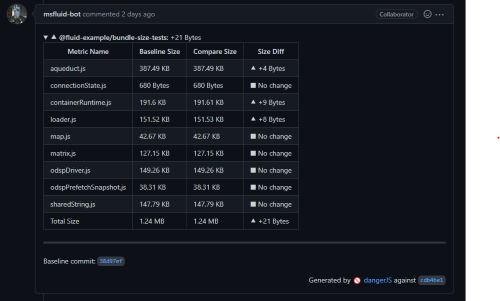Содержание
For client packages, the PR validation pipeline will run bundle size analysis to make sure the change doesn't grow developer's webpack bundle size inadvertently. If there are any changes to the bundle size for the measured scenarios, it will post a message to the PR with the comparison.
Some increase in bundle size can be reasonable depending on the change. It's up to the PR authors and reviewers to assess and agree on whether the increase is acceptable.
Run the bundle analysis locally
After building the client packages locally, run npm run bundle-analysis:collect at the root of the repo. The bundle size result can be found in artifacts/bundleAnalysis/@fluid-example/bundle-size-tests at the repo root.
report.htmlcan be opened in a browser to examine module composition to see what has grown in size.report.jsonare the bundle stats, and used to compare the before and after to detect improvement or regressions.
You can either generate your own baseline numbers, or you can look for the bundle analysis artifacts for the baseline commit in the Build - Client bundle size artifacts pipeline.
Advance Details
See README.md for bundle-size-tools for more detail of how the bundle stats are generated.
Overview
Contributing
- Submitting Bugs and Feature Requests
- Contributing to the Repo
- Repo Basics
- Common Workflows and Patterns
- Managing dependencies
- Client Code
- Server Code
- PR Guidelines
- CI Pipelines
- Breaking vs Non-Breaking Changes
- Branches, Versions, and Releases
- Compatibility & Versioning
- Testing
- Debugging
- npm package scopes
- Maintaining API support levels
- Developer Tooling Maintenance
- API Deprecation
- Working with the Website (fluidframework.com)
- Coding Guidelines
- Documentation Guidelines
- CLA
Using Fluid Framework
This wiki is focused on contributing to the Fluid Framework codebase.
For information on using Fluid Framework or building applications on it, please refer to fluidframework.com.
